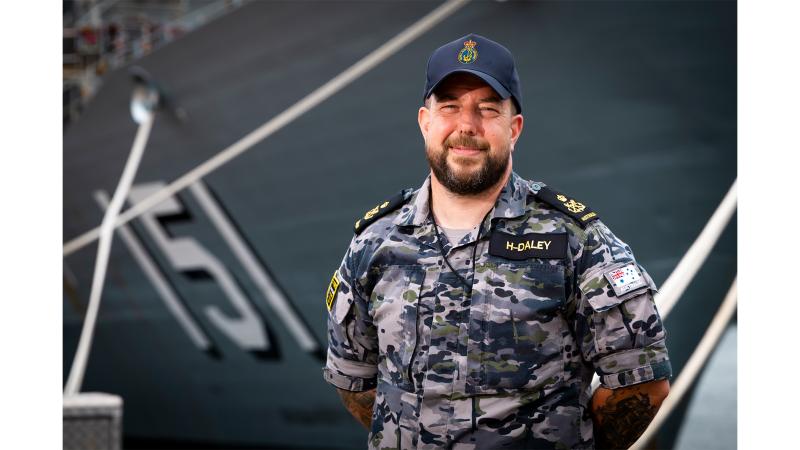7 July 2025
The smoke from the campfire lingered in the air as Army Regimental Sergeant Majors (RSMs) participated in Exercise Greenskin on Murrawarri Country in Weilmoringle, Culgoa National Park.
The exercise is part of Army’s cross-cultural capability initiatives, designed to give senior enlisted leaders a deeper understanding of why soldiers serve, and the communities that support them.
By spending time on Country, meeting Elders and learning directly from local traditions, the program helps RSMs connect more meaningfully with the diversity of the Army they represent.
With RSMs being the custodians of Army culture, it also strengthens their understanding of Army’s shared stories with community and builds cross-cultural skills that are equally relevant on operations abroad.
The most recent Exercise Greenskin took place across several sites in north-western NSW over eight days.
The first stop was Walgett, one of the towns visited during the 1965 Freedom Ride led by Charles Perkins, where RSL clubs once prohibited Aboriginal veterans from entering.
This experience left a strong impression on RSM – Ceremonial Warrant Officer Class One (WO1) Matt Fuery.
“Spending time with Aunty Dorris, listening to her stories and learning about the Freedom Ride was unforgettable,” WO1 Fuery said.
“It helped us understand the long road we’ve had in closing the gap. It was startling to learn that returned Aboriginal and Torres Strait servicemen weren’t welcome in the RSLs.”
The area was chosen as it holds deep connection to Army history. It is the birthplace of Private Harold West and Private George Leonard, two Murruwarri men who enlisted together in August 1941 at Goodooga.
They served side by side in the 2/1st Infantry Battalion in the Middle East, Ceylon (now Sri Lanka), and along the Kokoda Trail in Papua New Guinea.
'It was startling to learn that returned Aboriginal and Torres Strait servicemen weren’t welcome in the RSLs.'
Both men grew up on the border of Queensland and NSW, learning to hunt, track and live off the land – skills that later served them and their units in combat.
Private Leonard was killed in action during the Battle of Kokoda. Private West became known for crawling into enemy lines at night, stripped down and armed only with grenades.
His bravery was so renowned it was reported in the Australian media. He died from illness linked to a broken leg while on the Kokoda Trail.
Sapper Bert Beros later penned A Coloured Digger, a poem about Private West, lamenting Australia’s ill-treatment of its Indigenous veterans.
After paying respects to fallen veterans in Bourke, the program joined the annual Murrawarri cultural camp at Weilmoringle where Exercise Greenskin participants connected with descendants of Private West and Private Leonard, took part in traditional weapon-making, and learnt about Murrawarri warrior history.
Men crafted lil-lils (an axe-like boomerang), while women worked on digging sticks, passing on skills that reflect cultural knowledge.
A triservice effort, the camp included current serving Murrawarri, Army and Air Force members, a Navy submariner veteran, and Army cadets.
In partnership with the Air Force, a Murrawarri pilot flew a Hercules aircraft into Brewarrina, bringing culture and capability together in one of the most remote parts of the country, attracting nearly the entire town of Brewarrina.
Exercise Greenskin concluded by paying respects to Private West and Private Leonard at their memorial in Goodooga where the ode was spoken in Murrawarri by a current serving Murrawari member, and also in English by the RSM of the 1/19th Battalion, Royal NSW Regiment – the unit that holds the battle honours for Private West's and Private Leonard’s battalion.
'A key takeaway for me was the importance of understanding the vast cultural differences across the Aboriginal and Torres Strait nations.'
This was the second of three planned immersions under Project Greenskin.
WO1 Fuery said he was lucky to attend both immersions.
“A key takeaway for me was the importance of understanding the vast cultural differences across the Aboriginal and Torres Strait nations,” WO1 Fuery said.
“Fred Hooper, a proud Murrawarri ex-RAN (Royal Australian Navy) sailor, asked the group to think of the continent of Australia as akin to countries in Europe when considering differences between culture, language and traditions of Aboriginal people – and that stuck with me.
“I had never thought of it this way before, and it was apparent when taking part in this immersion in comparison to that held in Gapuwiyak last year.
“This has taught me of the importance in engagement with local community before conducting an event to ensure our actions are respectful of the local customs and traditions, much like the differences in customs and traditions between the three services.”
The term “greenskin” dates back to Vietnam, used by soldiers to describe the unifying experience of wearing the uniform and the shared responsibility of service.
“Learning from the past assists in improving the future,” WO1 Fuery said.
“When we take time to understand Country, culture and community, we gain trust and build stronger bonds. That’s the foundation of an Army that truly serves the Nation.”
On July 9, the Australian War Memorial will conduct a Last Post Ceremony to share the story of Private Harold West and Private George Leonard.


